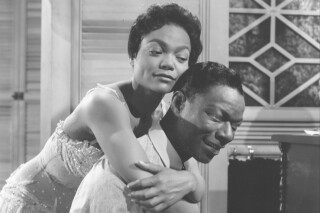Today in History: February 15, Singer Nat King Cole dies at 45

Eartha Kitt hugs Nat King Cole, playing the piano in the role of W.C. Handy, in a scene from the 1958 movie “St. Louis Blues.” (AP Photo)
Today in History:
On Feb. 15, 1965, singer Nat King Cole, who despite facing extreme racism throughout his short career sold more than 50 million records that included massive hits such as “Mona Lisa” and “Route 66,” died in Santa Monica, California. He was 45.
On this date:
In 1764, the site of present-day St. Louis was established by Pierre Laclede and Auguste Chouteau.
In 1879, President Rutherford B. Hayes signed a bill allowing female attorneys to argue cases before the Supreme Court.
In 1898, the U.S. battleship Maine mysteriously blew up in Havana Harbor, killing more than 260 crew members and bringing the United States closer to war with Spain.
In 1933, President-elect Franklin D. Roosevelt escaped an assassination attempt in Miami that mortally wounded Chicago Mayor Anton J. Cermak; gunman Giuseppe Zangara was executed more than four weeks later.
In 1944, Allied bombers destroyed the monastery atop Monte Cassino in Italy.
In 1950, Walt Disney‘s animated film “Cinderella” premieres in Boston.
In 1961, 73 people, including an 18-member U.S. figure skating team en route to the World Championships in Czechoslovakia, were killed in the crash of a Sabena Airlines Boeing 707 in Belgium.
In 1967, the rock band Chicago was founded by Walter Parazaider, Terry Kath, Danny Seraphine, Lee Loughnane, James Pankow and Robert Lamm; the group originally called itself The Big Thing, then Chicago Transit Authority.
In 1989, the Soviet Union announced that the last of its troops had left Afghanistan, after more than nine years of military intervention.
In 1992, a Milwaukee jury found that Jeffrey Dahmer was sane when he killed and mutilated 15 men and boys. (The decision meant that Dahmer, who had already pleaded guilty to the murders, would receive a mandatory life sentence for each count; Dahmer was beaten to death in prison in 1994.)
In 2003, millions of protesters around the world demonstrated against the prospect of a U.S. attack on Iraq.
In 2005, defrocked priest Paul Shanley was sentenced in Boston to 12 to 15 years in prison on child rape charges.
In 2013, with a blinding flash and a booming shock wave, a meteor blazed across Russia’s western Siberian sky and exploded, injuring more than 1,000 people as it blasted out windows.
In 2018, the last of the bodies of the 17 victims of a school shooting in Florida were removed from the building after authorities analyzed the crime scene; 13 wounded survivors were still hospitalized. In response to the shooting, President Donald Trump, in an address to the nation, promised to “tackle the difficult issue of mental health,” but avoided any mention of guns. Nikolas Cruz, the suspect in the shooting, was ordered held without bond at a brief court hearing.
In 2021, salsa music idol Johnny Pacheco died at 85 in New York, where he’d been hospitalized with pneumonia.
In 2022, the families of nine victims of the Sandy Hook Elementary School shooting agreed to a $73 million settlement of a lawsuit against the maker of the rifle used to kill 20 first graders and six educators in 2012.
In 2023, Raquel Welch, whose emergence from the sea in a skimpy, furry bikini in the film “One Million Years B.C.” would propel her to international sex symbol status throughout the 1960s and ’70s, died at age 82.
